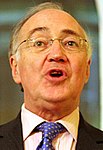United Kingdom local elections, 2004
|
|
|||||||||||||||||||||||||||||||||||||||||
|---|---|---|---|---|---|---|---|---|---|---|---|---|---|---|---|---|---|---|---|---|---|---|---|---|---|---|---|---|---|---|---|---|---|---|---|---|---|---|---|---|---|
|
|||||||||||||||||||||||||||||||||||||||||
|
All 36 metropolitan boroughs, 40 out of 46 unitary authorities, 232 out of 238 English districts, 1 directly elected mayor, 1 regional assembly and all 22 Welsh principal areas |
|||||||||||||||||||||||||||||||||||||||||
|
|||||||||||||||||||||||||||||||||||||||||
The United Kingdom local elections of 2004 were held on 10 June, as part of the 2004 set of elections along with the European elections and the London mayoral and Assembly elections.
The councils of all the metropolitan boroughs in England and all the principal areas of Wales were all up for re-election, along with many other district and unitary authorities throughout England. No local elections were held in Scotland.
They were the first since the election of Michael Howard to the leadership of the Conservative Party. Howard was looking for a good result in the election to confirm that the Conservatives were back on the road to being able to seriously consider winning the next general election.
Early results confirmed that the Labour Party was having a bad time. Deputy Prime Minister John Prescott said that, "Iraq was a cloud, or indeed a shadow, over these elections. I am not saying we haven't had a kicking. It's not a great day for Labour".
However the Conservatives were not making many of the gains that would have indicated a complete change of electoral fortune. The national equivalent share of the vote in the election was found by academics Colin Rallings and Michael Thrasher to be 37% to the Conservatives, 27% to the Liberal Democrats and 26% to Labour. For one of the two major parties to come third in local elections was unheard of in the post-1945 period, let alone for a governing party with such a large majority to come third.
...
Wikipedia



